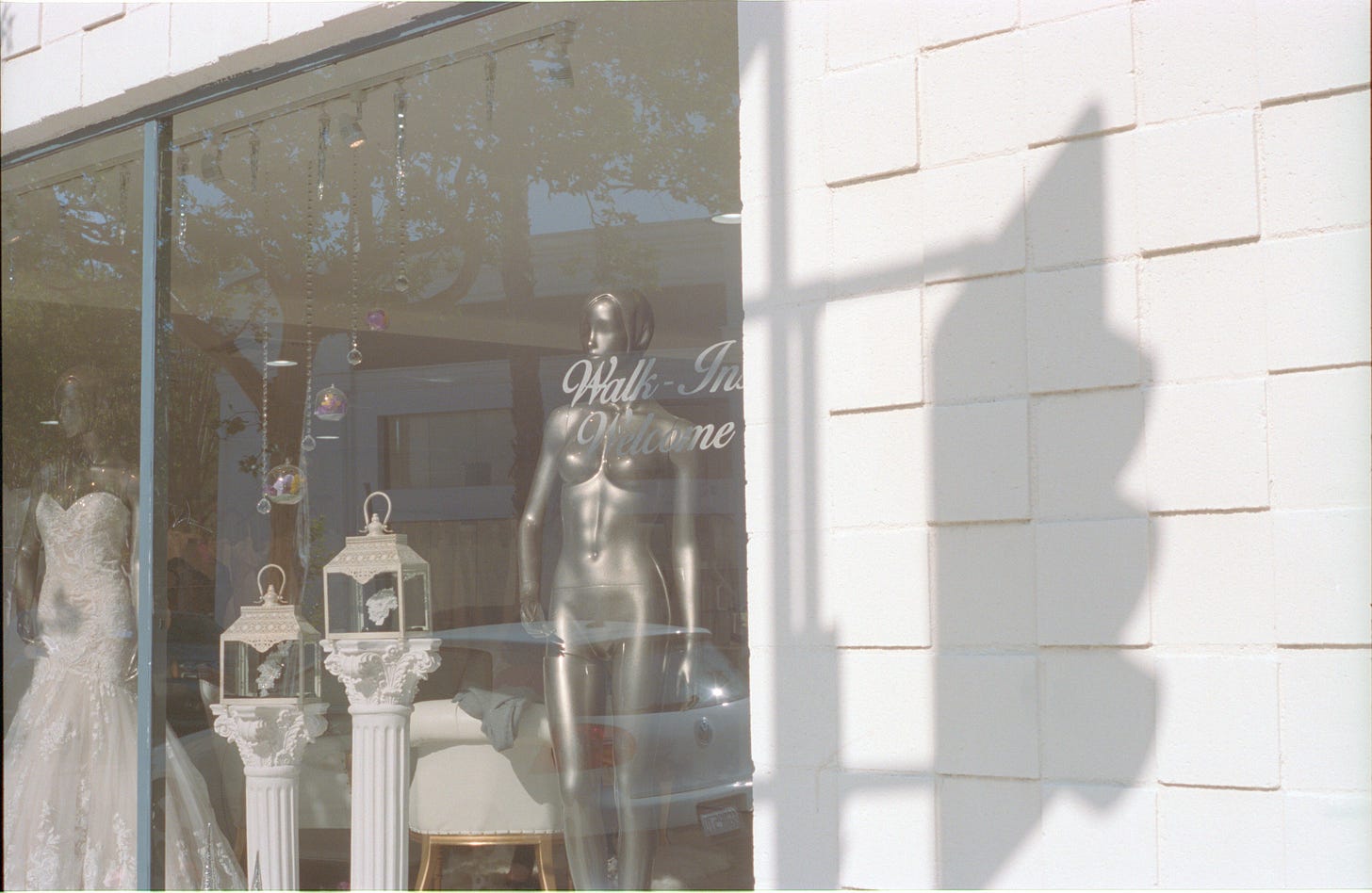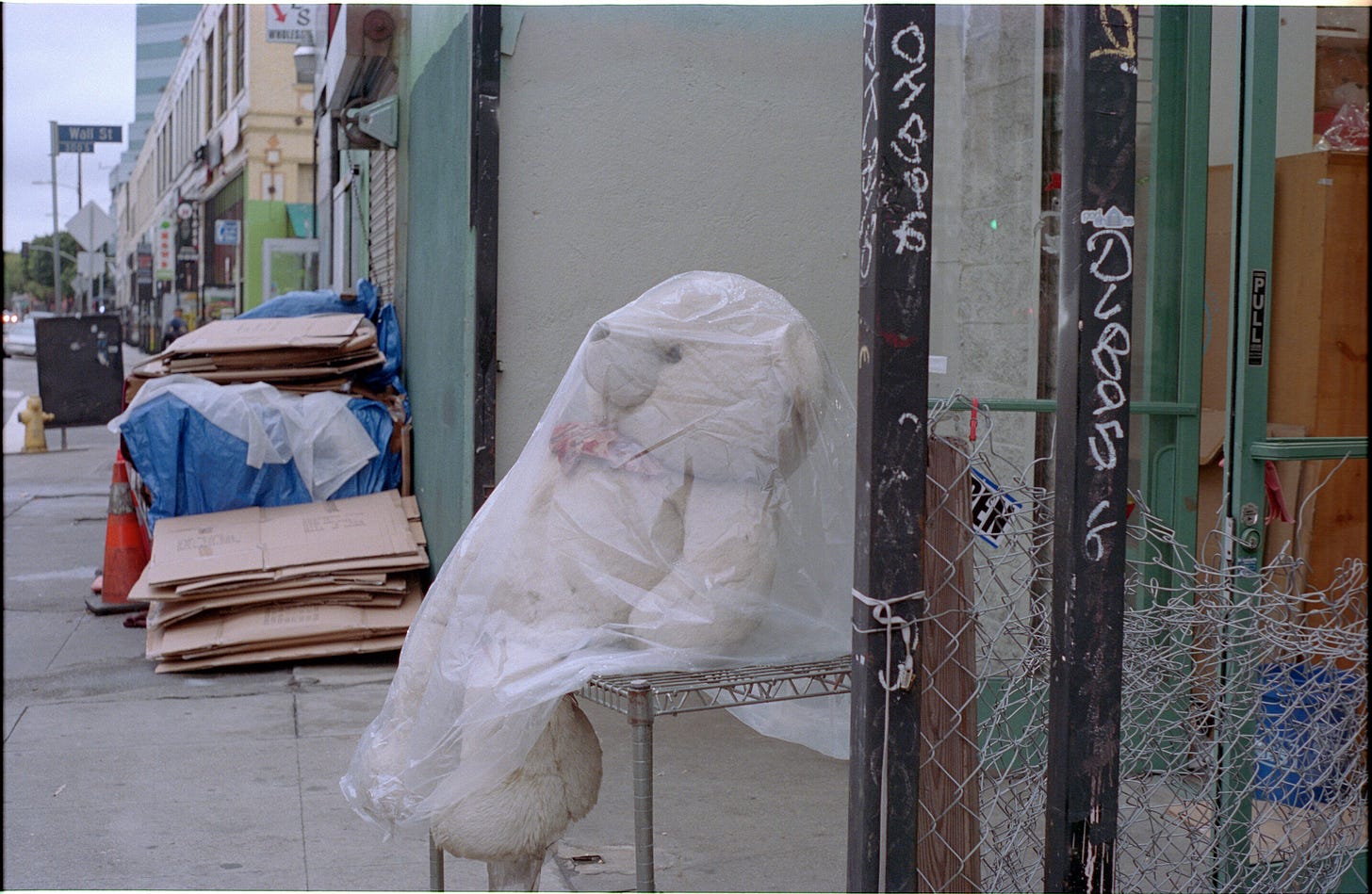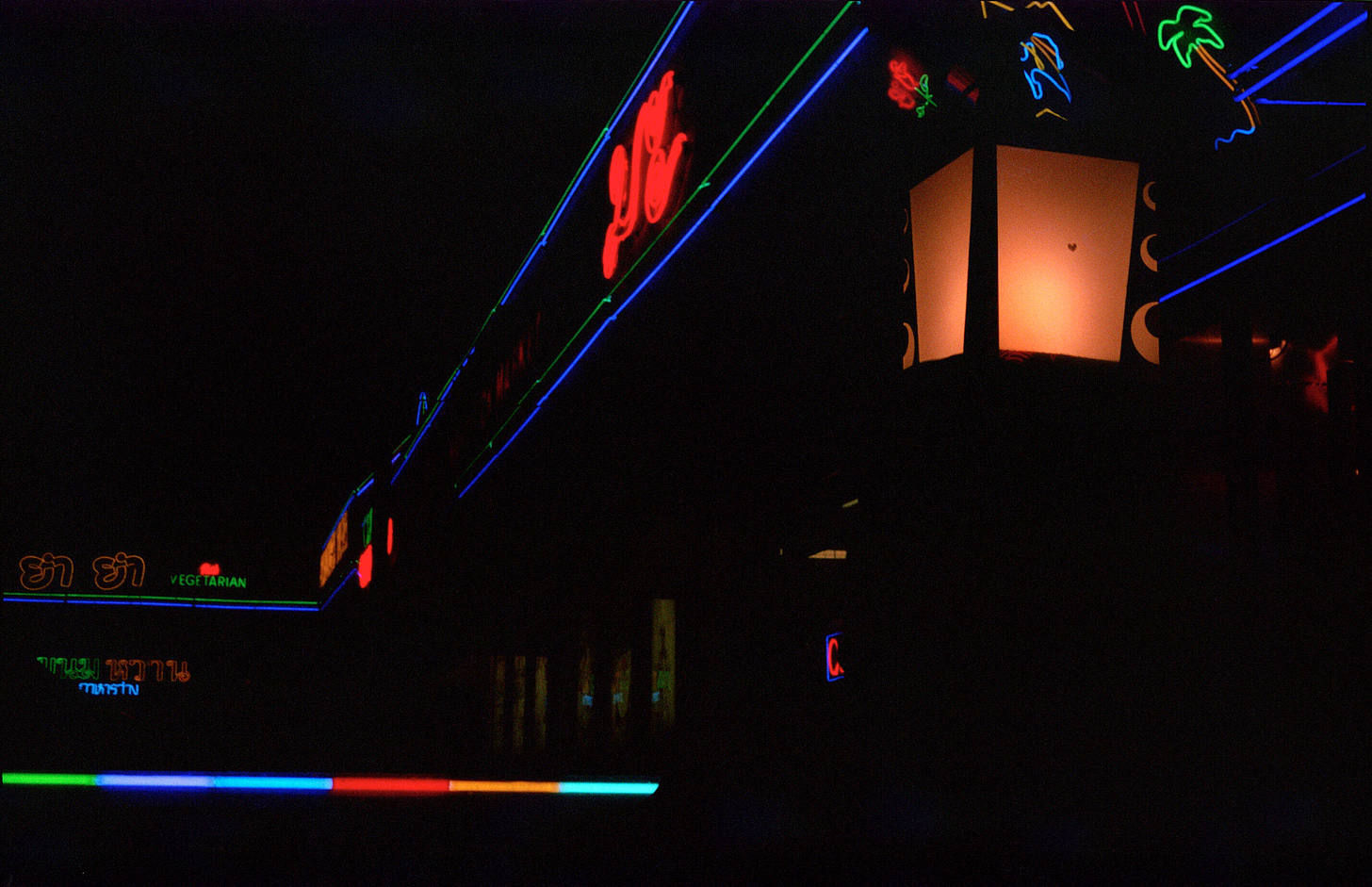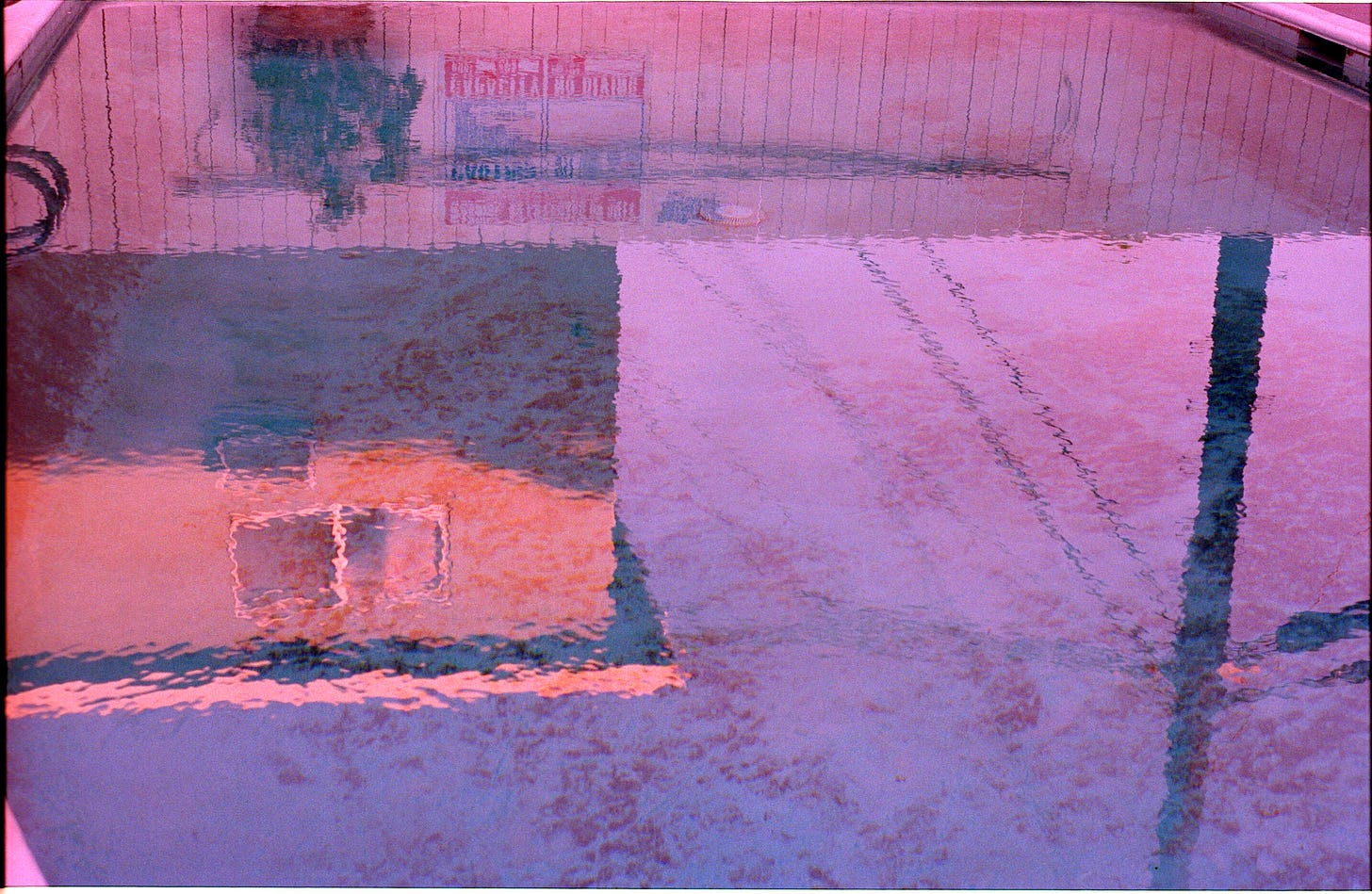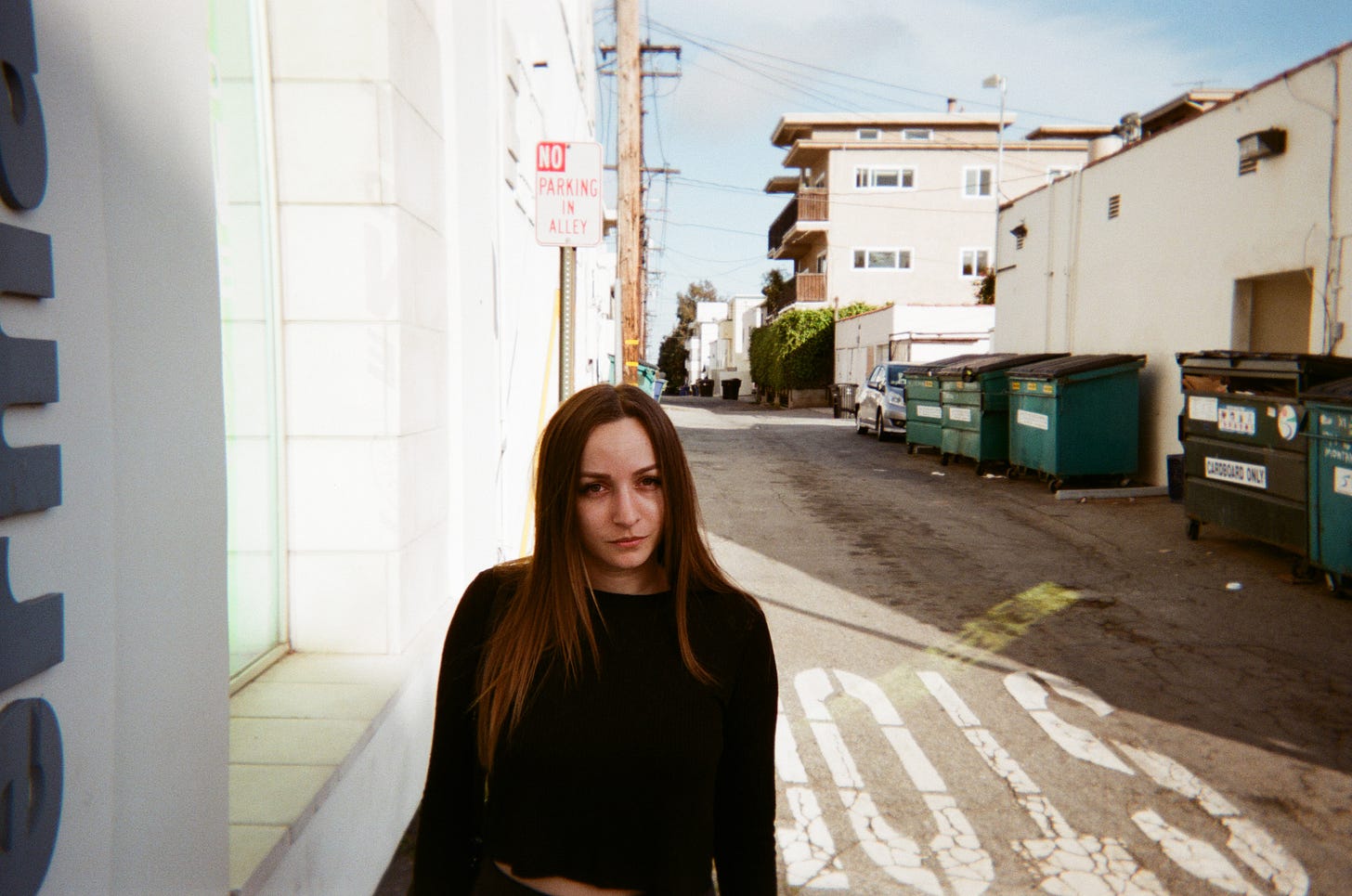Stealing on Main Street
Under the California sun, Brittany Ackerman faces existential anxiety in early 2000s retail hell.
The shift at the store started at 10 a.m. and went until close. No mornings, nights, or mids, just one long shift that all sales associates shared. Everyone came in at the same time, left at the same time. The store’s name was only two initials, two letters I never knew the meaning of. I hated working there, but I loved the drive. From Westwood to Santa Monica, the commute was tranquil. Heavy traffic moved in the opposite direction. I was heading away from the city while everyone else was heading into it. The store sat on Main Street, between 2nd and Pacific Ave, the ocean only a few blocks away. I liked being close to the water. I liked that if I wanted to, I could walk to the beach. I never did it, but I liked knowing I could.
I went to work in sweatpants and changed when I got there. We all got to pick out whatever we wanted off the sales floor and wear it for the day, then we changed back into our street clothes and went home. Everyone was allowed to keep a trash bag in the stockroom of items they wanted to purchase for themselves. Some bags were overflowing, waiting for the 75% off end of season sale, with an additional 25% employee discount.
I was working at the store because my job in public relations paid me shit. I needed more money, all the time: for rent, for food, for living in Los Angeles.
Every day I prayed that R would call and tell me to come over after work. I imagined buying an outfit from the store and wearing it for him, driving to his place in Venice and walking up the stairs to reveal myself in something he’d never seen me in before. We’d text all day, a thread of messages that kept me afloat during the creeping eight hours, but there was always the eventual letdown. I’d try to convince him to meet me at the Victorian down the street, where my coworkers got drinks sometimes. They had live music. R wasn’t interested. He either wanted me to come over or he wanted nothing at all. He said he was going through a phase. He said he was depressed. He said he needed to work on his paintings.
I didn’t care much for the girls at the store. They were all models and only doing this job because their real work was slow. They were skinny and pale and perfect. They never styled their hair but it always looked good. One of the girls, a blonde, wore purple feathers in it. She said one of her friends was a hairdresser and had put the feathers in with pliers. She described how a feather was threaded through a bead and then squeezed into place together with the hair. She said they lasted as long as you could take care of them. My one and only friend, Jen, said feathers were stupid. She put tinsel in her hair by tying pieces of it to her own strands. A meticulous process.
Jen was a hostess at the Laugh Factory in Hollywood. She wanted to be a comedian. She also worked as a receptionist at Equinox. She wore a shirt that said GREET that I always misread as GREAT. Jen was in love with some guy from college. They kept in touch through Facebook. She often had me take pictures of her so she could send them to him. The pictures were blurry—her underneath a streetlight, her sitting on the edge of her bed—but she always looked beautiful.
We saw each other as much as we could between jobs. We understood the need to pick up shifts and drop plans for potential cash. She told me I should try to get into a writers room, work for a TV show or try to sell a script. She didn’t pressure me, but she believed in me like an angel that lived on my shoulder.
I was working at the store because my job in public relations paid me shit. I needed more money, all the time: for rent, for food, for living in Los Angeles. I lived in a tiny studio apartment in Westwood. It was enough space, it was a good enough location, but I dreamed of getting out and renting a one-bedroom with R. He’d said he wanted to live together, but he wasn’t ready yet. He’d send me Redfin ads with exclamation points, but then the listings would get taken and he said there’d be more. People were always coming and going, coming and going.
Sometimes I stole clothes from the store. I’d pretend a trash bag full of clothes was full of real trash and offer to dump it in the bin on the way out to my car. Instead, I’d shove it in my trunk and haul my way back to Westwood, leaving Santa Monica and its glorious sunset behind as I drove. The sky was orange in my rearview mirror.
The girls at the store were jealous when I returned to work with tinsel in my hair. They wanted to know the process, where they could get some, how long it lasted. I acted vague and aloof, like it was some big secret. This was before you could just look things up online. This was when word of mouth was how things traveled. You saw someone on the street wearing a kimono cardigan over a high-low dress with gladiator sandals and then you went out and bought some. This was how we were influenced then—not by bots or algorithms, but by the people around us. We all watched MTV. We all still had cable. If Ashley Tisdale wore a tribal print bandage dress to the VMAs, we all saw it and wanted it and then went to Forever XXI. Everything was neon and skulls and statement necklaces and statement tights and Boho and bubble skirts and headbands. Fashion was a place we were all trying to get to and we had gotten so very lost along the way.
I managed to get through each day by stashing tank tops and jean shorts into the trash bag in my cubby in the stockroom. I ate rice and seaweed from a shop down the street. I texted R and waited for his reply. I walked down Main Street hoping something magical would happen to me. Maybe an agent would notice me and ask me to be a model, say he was going to make me famous.
Sometimes I thought it would be my mom who would save me. I thought the clothes would save me, too. I thought that if I could find the right outfit, some key would be turned, and my life would finally begin.
I visited other stores on the block, ones that re-sold designer handbags and one-of-a-kind sneakers and jewelry they welded onto your wrist so you could never take it off. There was a store where you could bring clothes in and get cash in return. I’d move the stolen clothes from the store into duffel bags and bring them in to sell. I made hundreds of dollars. I even bought myself a Fendi bag from the consignment store. It was small and brown with F’s all over and it made me happy to carry it around. It made me feel real.
Every once in a while I’d get a customer who was someone famous and wanted me to completely style an outfit for them. Mostly I got mother-daughter duos who fought through their entire purchase, which always ended up being close to a grand. Otherwise I stayed upstairs where no one ever went because it only housed last season’s stuff. I’d fold and refold thermal leggings and leather pants and try on beanies in the full-length mirror.
The weather was always perfect, which made me feel like I should be spending my days outside. The people who shopped at the store had so much more money than I ever would.
Even though I worked around so many people, there was an omnipresent loneliness. The weather was always perfect, which made me feel like I should be spending my days outside. The people who shopped at the store had so much more money than I ever would. They weren’t working retail, they were enjoying it as a leisurely activity. I didn’t have a choice. I felt like I was dying, like every day was potentially my last.
During lunch, I walked down Main Street and pretended I didn’t have to go back to the store. I pretended I was on my way to get a facial or that I was meeting R for lunch. I dreamed of eating outside at one of the restaurants where you could sit at a table on the sidewalk and people could envy you as they walked by. I wanted the days to be so much fuller than they were.
I’d call my mom on breaks, sitting on a concrete block out back of the store, and cry. I’d tell her I wanted to come home, and she’d remind me there was nothing for me back in Florida. She’d say I needed to figure out what I really wanted to do.
Sometimes I thought it would be my mom who would save me. I thought the clothes would save me, too. I thought that if I could find the right outfit, some key would be turned, and my life would finally begin. If I had a real boyfriend, a real job, a real wardrobe, a real group of friends, an apartment with at least one whole bedroom, air conditioning, laundry in the unit, car payments I wasn’t struggling to make, if I was able to decorate my own walls and find my own style, if I could know who I was outside of waiting for someone to tell me. But each night after work I’d end up back at my apartment, eating pasta in the shape of tiny wheels.
R called me and I missed the call. I was helping a woman choose between a pair of purple dyed denim shorts and a pair of yellow dyed ones. She ended up getting both. I called him back when work was over and we were waiting for the manager to reconcile the register. He asked if I could come over. I was so excited. He must be coming out of his depression, I thought. He must feel better. He must be healed. I told everyone in the store about our imminent date and the manager said I could pick out an outfit to wear. I chose a bodycon dress, black and red, with cutouts above the hips. I laced up my combat boots and raced over.
I parked and walked across the street and ascended the steps to R’s place. He answered the door, already wearing his jacket. He locked the door behind us before I was even inside.
“Where are we going?” I scanned the street for his black Mustang.
“I have to pick up my car from the dealership. They’ve had it all day.” He examined the tinsel. “What’s that in your hair? You look like a little girl.” It must have been shimmering in the moonlight.
“Okay,” I said, leading the way to my car. “What are we doing after that?”
“I’m not really in the mood to do anything.” He motioned for me to hand over my keys.
I envisioned the evening, me taking him to the dealership and waiting in the showroom while he signed papers and made jokes with the girl at the desk. I saw myself standing there with my arms crossed, trying to conceal the cutouts of my dress, trying to make myself small, wishing I had taken a jacket from the store too, knowing R wouldn’t give me his.
If only I could have seen how open my life was—the door was swung wide open and all I had to do was walk through. That I had to be the one to save myself. No one else was coming.
I’d reached my limit.
“I’m not taking you to the fucking dealership!” I yelled. Maybe I was a little girl, throwing a tantrum, hands balled into fists at my sides, heart racing. “I’m not doing it.”
“Jesus.” R took a pack of cigarettes out of his back pocket. He lit one and I was jealous that he had something to do and I didn’t while we both stood there facing each other.
If this were a movie, R would have walked over to me and apologized. He’d put out his cigarette and wrap his arms around me. He’d say the dealership thing was a joke and his black Mustang would suddenly appear, somewhere I hadn’t looked before. We’d get in and he’d take me to a club and we’d dance and drink away our problems. He’d tell me that depression was a dark cloud that came and went for him, like the weather changing. “It’s not like LA,” he’d say, “Always 70 and sunny. It’s more complicated in my head. But I’m working on it. I feel better when I’m with you.”
None of that happened.
“I’m leaving,” I said and opened the driver’s side door. And then I was driving away, on the highway, watching the tall buildings come back into view. I parked in the underground garage and went upstairs to my apartment and made myself the tiny pasta wheels and went to bed.
The next day at the store, the manager asked me to go to the farmer’s market down the street and hand out flyers to anyone who looked like they might wear our clothes. She handed me a stack of flyers. She said I could walk there, it wasn’t too far.
It was Sunday so the farmer’s market was the place to be. I worried for a moment that I might see R, but then I remembered he would never go to a farmer’s market. It was all make-your-own-bouquets and fresh samosas and fair trade coffee beans. There was live music, a girl in a white dress playing guitar and singing about the summer sun.
I saw a girl drinking out of a coconut and asked her where she got it. She pointed to a stall nearby. I threw the stack of flyers in the trash and got my wallet out of my purse.
When I left work that night, I knew I’d never see the store again.
When I left work that night, I knew I’d never see the store again. Years later, the store would close and become a place you could only visit online. There’d be some controversy with the owner. There’d be buy-out, a re-brand, marketing emails that I eventually unsubscribed from.
I took one last haul of clothing home that night. I dumped all the trash bags I had collected out on the floor, things I hadn’t yet sold or given away to Jen. I made one last small pile for her, including the bodycon dress. She’d been saying she wanted one like that for a while. It was hers. The rest of the clothes sold and made a lot of money. I used that money to get my nails done and get massages and I even took Jen to Magic Mountain. I eventually used the rest to buy a plane ticket back to Florida.
At the farmer’s market, I knew I should be happy. Nothing was terrible. I was drinking out of a coconut and sitting on the grass listening to music. If only I could have seen how open my life was—the door was swung wide open and all I had to do was walk through. That I had to be the one to save myself. No one else was coming.
But I couldn’t see it then, of course. All I could think about was how life was unfair.
I saw another girl walk by, wearing a headband made of flowers. I thought that if I had a headband just like hers, I would probably be okay.



